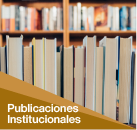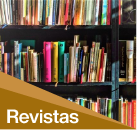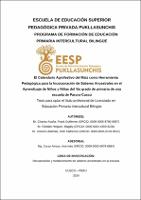Mostrar el registro sencillo del ítem
El Calendario Agrofestivo del Maíz como Herramienta Pedagógica para la Incorporación de Saberes Ancestrales en el Aprendizaje de Niños y Niñas del 4to grado de primaria de una escuela de Paruro-Cusco
| dc.contributor.advisor | Corzo Arroyo, Ana Inés Carolina | |
| dc.contributor.author | Chavez Acuña, Frank Guillermo | es_PE |
| dc.contributor.author | Rondan Holguin, Magaly | es_PE |
| dc.contributor.author | Umeres Alatrista, Ruth Katerine | es_PE |
| dc.date.accessioned | 2025-06-02T01:25:18Z | |
| dc.date.available | 2025-06-02T01:25:18Z | |
| dc.date.issued | 2024-04-23 | |
| dc.identifier.uri | http://repositorio.pukllasunchis.org/xmlui/handle/PUK/119 | |
| dc.description.abstract | La presente investigación sobre el calendario agrofestivo como estrategia didáctica impactó en el proceso de aprendizaje de los niños y las niñas en la escuela al ofrecer experiencias enriquecedoras que complementan la educación de los niños, como la conexión con la naturaleza, aprendizaje práctico, desarrollo de habilidades sociales, etc. El maíz como uno de los cultivos más importantes de la comunidad, no solo desempeña un papel importante en la alimentación, sino que también está profundamente arraigado en la tradición y la identidad cultural de dicha comunidad. La investigación se llevó a cabo en la provincia de Paruro, desde un enfoque cualitativo y el enfoque metodológico que mejor se ajustó a nuestra investigación fue la investigación acción participativa, puesto que esta metodología se enfoca en recoger, diseñar y aplicar estrategias para solucionar el problema planteado lo cual nos ayudó a recopilar información a través de entrevistas a los sabios, padres de familia, docentes y estudiantes. Los resultados de esta investigación evidenciaron que el calendario agrofestivo de la crianza del maíz juega un papel muy significativo e importante en el aprendizaje de los estudiantes en esta provincia. Durante las festividades y rituales relacionados al maíz, se inculca la transmisión de conocimientos tradicionales de generación en generación. Por otra parte, los estudiantes participaron en algunas actividades, adquiriendo saberes de prácticas relacionadas con la agricultura y la preservación de la cultura. Además, la conexión que se formó entre niños, niñas y el calendario agrofestivo del maíz ayudó a fortalecer su sentido de pertenencia a la comunidad y a reafirmar su identidad. Asimismo, el aprendizaje a través de la participación activa en estas tradiciones culturales incluso mejora la retención del conocimiento y la motivación para aprender. La crianza del maíz se puede integrar en diversas áreas curriculares como en ciencia y tecnología, matemática, personal social, comunicación, etc. Por ejemplo, los estudiantes pueden aprender el ciclo de vida del maíz en ciencia y tecnología, realizar cálculos matemáticos relacionados a la siembra y cosecha, explorar la historia e importancia cultural del maíz en el área de Personal Social. La provincia de Paruro ha experimentado una pérdida de sus prácticas culturales relacionadas con el maíz, es escaso el interés y la comprensión cultural entre los niños y las niñas. Es por eso que sugerimos que el calendario agrofestivo del maíz es muy importante para mantener y revitalizar estas prácticas culturales para preservar la identidad y promover un aprendizaje significativo entre las generaciones más jóvenes. | es_PE |
| dc.description.abstract | Abstract The present investigation of the agro-festival calendar as a strategy impacted the learning process of boys and girls at school by offering enriching experiences that complement children's education, such as connection with nature, practical learning, development of social skills, etc Corn, as one of the most important crops in the community, not only plays an important role in food, but is also deeply rooted in the tradition and cultural identity of said community. The research was carried out in the province of Paruro, from a qualitative approach and the methodological approach that best suited our research was participatory action research, since this methodology focuses on collecting, designing and applying strategies to solve the problem. raised which helped us collect information through interviews with wise men, parents, teachers and students. The results of this research showed that the agro-festive calendar of corn raising plays a very significant and important role in the learning of students in this province. During the festivities and rituals related to corn, the transmission of traditional knowledge from generation to generation is instilled. On the other hand, the students participated in some activities, acquiring knowledge of practices related to agriculture and the preservation of culture. Furthermore, the connection that was formed between boys and girls and the corn festival calendar helped strengthen their sense of belonging to the community and reaffirm their identity. Likewise, learning through active participation in these cultural traditions has been observed to improve knowledge retention and motivation to learn. Corn raising can be integrated into various curricular areas such as science and technology, mathematics, social personnel, communication, etc. For example, students can learn the life cycle of corn in science and technology, perform mathematical calculations related to planting and harvesting, and explore the history and cultural importance of corn in social settings. The province of Paruro has experienced a loss of its cultural practices related to corn, there is little interest and cultural understanding among boys and girls. That is why we suggest that the corn agro festive calendar is very important to maintain and revitalize these cultural practices to preserve identity and promote meaningful learning among younger generations. Keywords: agricultural festival calendar, cultural identity, knowledge, corn reeding. | es_PE |
| dc.description.abstract | Pisi rimayllapi willasayki Kay kunan investigación calendario agrofestivo nisqamanta estrategia hina, yachaywasipi qhari wawakunap, warmi wawakunap yachay puriyninta, qhapaqyachiq experienciakunata quspa, chaytaq wawakunap yachachiyninta hunt’achin, imaynachus naturalesawan tinkuchiy, yachay ruway, yachaykunata kawsayta wiñachiy,hukkuna. Saraqa, llaqtapi aswan chaninchasqa tarpuykunamanta huknin kasqanraykum, manam mikhuyllapichu ancha allin ruwayniyuq, aswanqa chay llaqtapa tradicionninpi, identidad culturalninpipas anchatam saphichasqa kachkan. Kay investigacionqa ruwakurqa provincia Paruro suyupi, enfoque cualitativo nisqamanta chaymanta enfoque metodológico nisqa aswan allinta investigacionniykuman hina karqa investigación de acción participativa, chaymi kay metodología nisqa huñuypi, diseñar hinaspa estrategias nisqakuna churaypi kachkan chay sasachakuy allichanapaq. huqarisqa chaymi yanapawarqanchik huñunapaq willakuy yachaysapa runakunawan, tayta mamakunawan, yachachiqkunawan, yachakuqkunawan ima rimanakuywan. Kay investigacionpa ruwasqanmi qawachirqa sara uywaypa calendario agrofestivo nisqa ancha hatun hinaspa ancha allin ruwayniyuq kasqanmanta kay provinciapi yachaqkuna yachanankupaq. Sarawan tupaq raymikunapi, ritualkunapipas, ñawpaqmanta pacha yachaykunata miraymanta mirayman apachiymi churakun. Hukninpiqa, yachakuqkuna wakin ruwaykunapi yanapakurqanku, chakra llamk’aywan, cultura waqaychaywan ima ruwaykunamanta yachaykunata hap’ispa. Chaymantapas, qhari warmakuna warmi warmakuna ima, sara raymi calendario nisqawan tinkuchisqa kasqanmi yanaparqa llaqtaman pertenecesqankuta kallpanchanankupaq, chaynallataqmi pi kasqankuta yapamanta takyachinankupaqpas. Chhaynallataqmi, kay tradiciones culturales nisqapi allinta participaspa yachayqa qhawarisqa kachkan, yachaykunata waqaychayta, yachayta kallpanchanapaq. Sara uywayqa imaymana curricular nisqakunamanmi hukllawakunman, ciencia y tecnología, matemática, personal social, comunicación, hukkunapas. Ijimplupaq, yachakuqkuna yachankumanmi sarapa ciclo de vida nisqamanta cienciapi, tecnologiapi, ruwayta atinku yupay yupaykunata tarpuywan, cosechawan tupaq, chaynallataqmi sarapa historianmanta hinaspa cultural importanciantapas entornos sociales nisqapi qawarinmanku. Paruro suyuqa sarawan tupaq ruwayninkuna cultural chinkachisqañam rikhurirun, qhari warmakuna, warmi warmakunapas pisillam interesakuchkanku, chaynallataqmi cultural entiendeypas. Chay raykun yuyaychayku, sara agrofestivo nisqa calendario nisqa ancha allin kasqanmanta, kay ruwaykuna cultural nisqakunata waqaychanapaq, kawsarichinapaq ima, identidad nisqa waqaychaypaq, hinallataq wayna miraykunapi allin yachaykunata puririchinapaq. Chanin rimaykuna: chakra raymi raymi calendario, identidad cultural, yachay, sara mirachiy. | es_PE |
| dc.format | application/pdf | es_PE |
| dc.language.iso | spa | es_PE |
| dc.publisher | Asociación Pukllasunchis | es_PE |
| dc.rights | info:eu-repo/semantics/openAccess | es_PE |
| dc.rights.uri | https://creativecommons.org/licenses/by-nc-sa/4.0/ | es_PE |
| dc.subject | Calendario Agrofestivo | es_PE |
| dc.subject | identidad cultural | es_PE |
| dc.subject | Saberes Ancestrales | es_PE |
| dc.title | El Calendario Agrofestivo del Maíz como Herramienta Pedagógica para la Incorporación de Saberes Ancestrales en el Aprendizaje de Niños y Niñas del 4to grado de primaria de una escuela de Paruro-Cusco | es_PE |
| dc.type | info:eu-repo/semantics/bachelorThesis | es_PE |
| dc.type.version | info:eu-repo/semantics/publishedVersion | es_PE |
| dc.publisher.country | PE | es_PE |
| dc.subject.ocde | https://purl.org/pe-repo/ocde/ford#5.03.01 | es_PE |
| renati.advisor.orcid | https://orcid.org/0009-0003-0678-6884 | es_PE |
| renati.type | https://purl.org/pe-repo/renati/type#tesis | es_PE |
| renati.level | https://purl.org/pe-repo/renati/nivel#tituloProfesional | es_PE |
| renati.discipline | 112096 | es_PE |
| renati.juror | Eguiluz Duffy, Cecilia María | es_PE |
| renati.juror | Suárez Sánchez, Richard | es_PE |
| renati.juror | Conde Marquina, Antonieta | es_PE |
| thesis.degree.name | Licenciado en Educación Primaria Intercultural Bilingüe | es_PE |
| thesis.degree.discipline | Educación Primaria Intercultural Bilingüe | es_PE |
| thesis.degree.grantor | Escuela de Educación Superior Pedagógica Privada Pukllasunchis | es_PE |
| renati.author.dni | 76252166 | |
| renati.author.dni | 71077100 | |
| renati.author.dni | 76763154 | |
| renati.advisor.dni | 40881501 |







